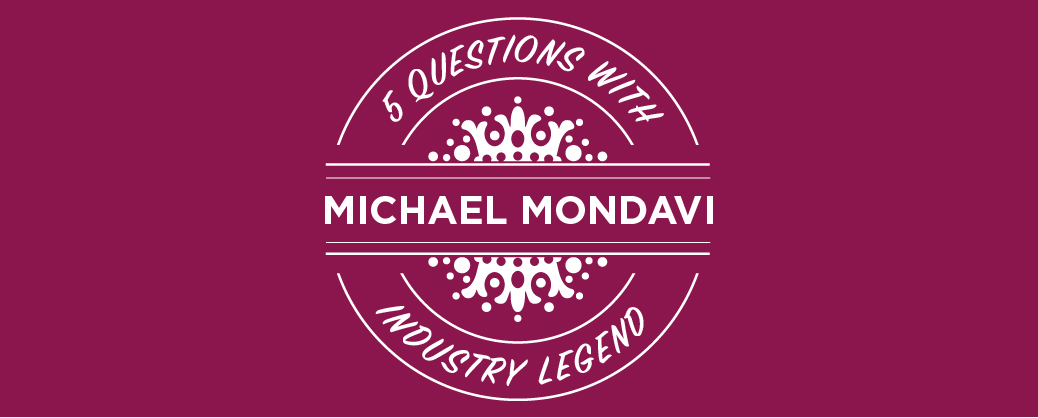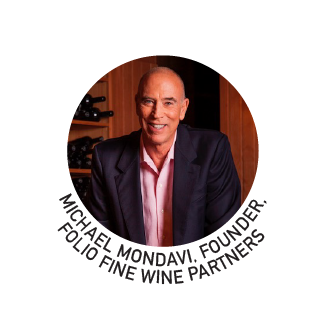5 Questions with Industry Legend Michael Mondavi
Jul. 28, 2017

The Mondavi family has been in the wine industry for four generations. From a grape packing business in California, to acquiring the Charles Krug Winery in the early '40s, the family quickly established themselves within the wine world following their emigration from Italy. 
In 1966 Robert Mondavi founded the Robert Mondavi Winery in Napa with his sons, with the goal of producing wines that would compete with the best European wines. His eldest son, Michael, helped with production before taking on sales, marketing and eventually business management for the winery.
Realizing the direction the industry was headed with consolidation, Michael decided to band together with other independent, family-owned wineries from Europe to distribute their wines in America. Enter Folio Fine Wine Partners, which Michael Mondavi founded in 2004.
Breakthru caught up with Mondavi recently to learn more about his experience in the industry, how Folio was established and where the he thinks the wine world is headed.
Your family has been in the wine world for generations. How have you seen the industry evolve?
In 1950, only about 5% of the wine sold in America was sold in a bottle. It was all sold in tank cars to distributors, and if you'd have come to Wirtz in 1950, in the warehouse would have been tanks, filters, pumps, and bottling equipment. They had their own labels, and the idea was the modern California wine business you ship the wine, 12,000 gallons at a time in a railroad car, to the distributor. The distributor will make its own blends, put their own labels on it, and sell it. There were thousands of regional brands, and only about three or four national brands. Today, it's almost 100% bottles that are sold. The other big change, 50 years ago, 82% of all wines sold in America was Port, Sherry or Muscatel; 18% was what we consider table wine today, and the vast majority of that was sold in a gallon jug and it was called Burgundy or Chablis. It was always sold on the bottom shelf of the supermarket, so the change has been dynamic.
You founded Folio Fine Wine Partners in 2004. How did that come to fruition?
We were a public company at Robert Mondavi, and my brother, sister and I decided that none of us were doing what we really loved to do anymore. I said, "You know, we're having to get up and go to work for the first time in our lives." I said, "Let's either buy ourselves back, or sell the company and reinvent ourselves."
The good-bad news was we were too successful to be able to afford to buy ourselves back. So we sold the company and my brother and sister started their own little winery in Napa. I decided that the way the consolidation was taking place in the industry, that if we didn't have enough volume of our own wines from Napa to be meaningful to the wholesaler, there's no way I was going to get the wine sold in the proper restaurant or wine shops outside of California.
I said, "You know what? The best wines in the world are going to be produced by family-owned, family-managed companies, not big corporations, and they're going to have the same problem I have. What if like the old guilds, where on weekends they'd get together and all the different craftsman would go to the main barn to sell their wares – what if we have independent, family-owned wineries working together in America to market and sell their wines?"
I proposed that idea to Vittorio Frescobaldi in Italy in 2003, and he thought it was a very good idea. He said, "If you do that and develop that business, I will let you represent our wines." My son, daughter and I knew that with the little vineyard and winery that we were going to start, we'd never be of a size or of a scale large enough to come to Breakthru and have a meeting, for example, if we just had our wines but not the others. It just wouldn't have happened. They'd say, "Oh, Michael. Yeah, we love your wine. Send us a sample, but don't bother us. Don't take our time."
Our Napa Valley wine business is about 25% of our dollar volume of our business; our imported business representing 17 families is 75%.
What’s that relationship like between your family and the other family-owned wineries Folio works with?
Over the last 12 years working with these families, it's not just that they ship the wine over and we sell it – we go through their vineyards and their wineries. My son, who's responsible for our vineyards and winemaking, and my daughter, they go and visit the others. We now have this idea exchange that takes place. We've learned how to grow better grapes and make better wine in Napa because of importing wine from these families in Italy, Spain, Austria and Argentina.
What differentiates a family-owned winery?
Passion, passion, passion. Pride. Ego. If we're not proud of the wine – and the families we work with, it's the same – if they're not proud of the wine, they don't put it in the bottle. If they won't put it on the table for family and friends at their home, they won't put it in the bottle.
Family businesses think generationally. Public companies think quarterly, short term, whatever is the answer you need for today. But family businesses I think have better, consistent values and better long-term strategy, and they understand that sometimes Mother Nature spanks us two or three years in a row. Other times, she's very generous. Sometimes the economy is wonderful. Sometimes it’s not. I'm not going to let that affect the quality or image of my family brand.
Where would you say the industry is headed?
I think that the wines that are being produced today are the best they have been, but if they stay status quo, they won't stay in business. We are learning how to produce wines that taste better today and don't need to be put in a cellar for five or 10 years. We're doing that through natural and organic farming, sustainable agriculture.
The young people today aren't going to be intimidated by Robert Parker, the Wine Spectator ratings; they're going to be more influenced by their friends. You taste a wine, you share some wine with your friends, and they're going to text or tweet, "Wow, I tasted this wine; it is so yummy!" Or, "I tasted this wine; tastes like dog breath."
I think that social media is going to be the main force on wine, and I think that when I started selling wine in the '60s and '70s, I wouldn't even approach someone who was younger than my father because people of my generation back then and younger people weren't interested in wine. Today, I won't talk to anybody older than my son because it's the young people that are the future of wine. I think that the Generation X is the first generation where both the men and the women choose wine as their favorite beverage over beer or spirits. The brown spirits – the rye and wonderful single-barrel bourbons – they're very hot today; they'll go through a trend, but wine just continues ka-ching, ka-ching, ka-ching – growing 3-5% every year.